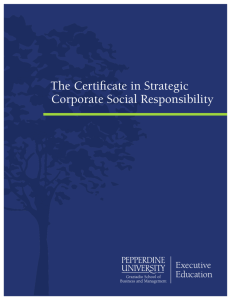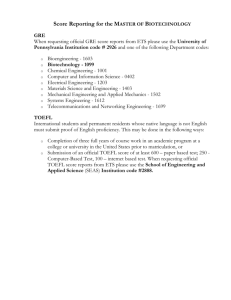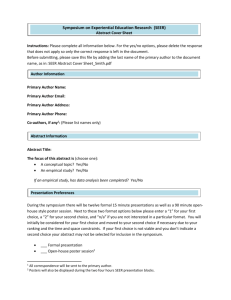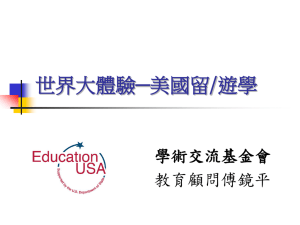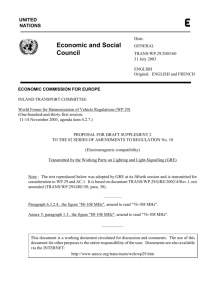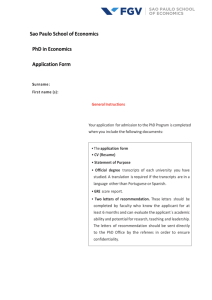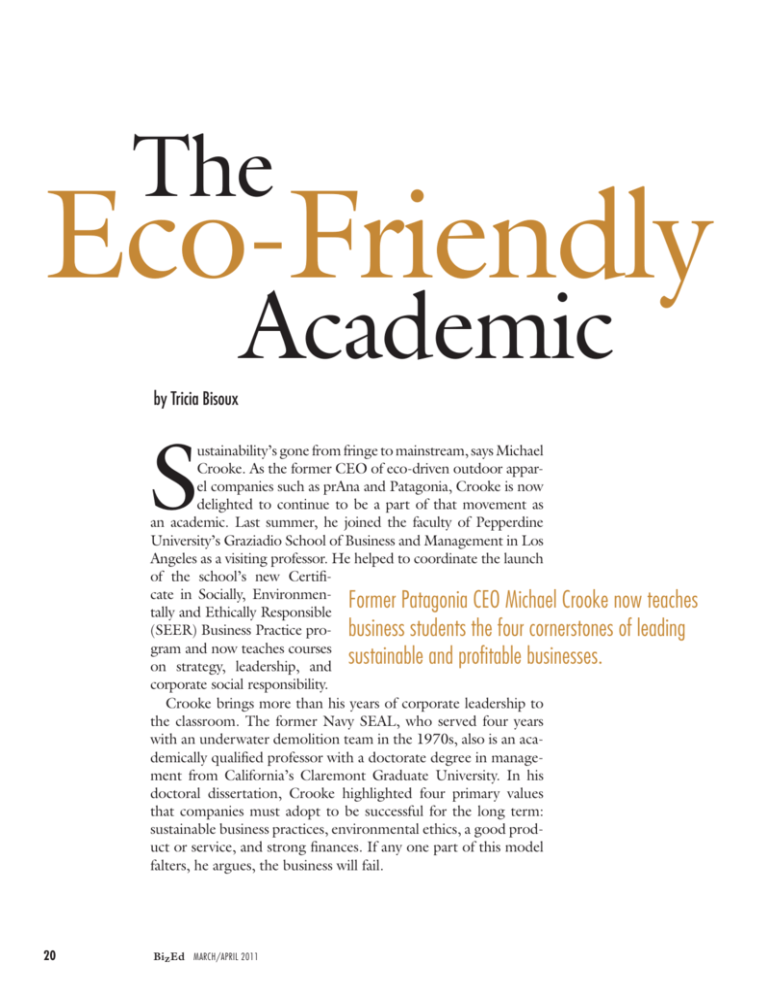
The
Eco-Friendly
Academic
by Tricia Bisoux
S
ustainability’s gone from fringe to mainstream, says Michael
Crooke. As the former CEO of eco-driven outdoor apparel companies such as prAna and Patagonia, Crooke is now
delighted to continue to be a part of that movement as
an academic. Last summer, he joined the faculty of Pepperdine
University’s Graziadio School of Business and Management in Los
Angeles as a visiting professor. He helped to coordinate the launch
of the school’s new Certificate in Socially, EnvironmenFormer Patagonia CEO Michael Crooke now teaches
tally and Ethically Responsible
(SEER) Business Practice pro- business students the four cornerstones of leading
gram and now teaches courses
on strategy, leadership, and sustainable and profitable businesses.
corporate social responsibility.
Crooke brings more than his years of corporate leadership to
the classroom. The former Navy SEAL, who served four years
with an underwater demolition team in the 1970s, also is an academically qualified professor with a doctorate degree in management from California’s Claremont Graduate University. In his
doctoral dissertation, Crooke highlighted four primary values
that companies must adopt to be successful for the long term:
sustainable business practices, environmental ethics, a good product or service, and strong finances. If any one part of this model
falters, he argues, the business will fail.
20
BizEd march/april 2011
photo courtesy of Pepperdine University
BizEd march/april 2011
21
When you accept
GRE scores, it’s good news
for your potential
MBA program applicants
®
Why? Because taking the GRE® General Test is a smart move.
More good news for applicants.
The GRE® revised General Test —
launching in August 2011 — will
offer your applicants a new
test-taker friendly format for
a better test experience.
Sign up for updates at
www.ets.org/gre/updates/bized.
• The GRE® General Test is the ONLY admissions test that can help
your applicants pursue their MBA and other graduate degrees,
depending on their career path
• The GRE General Test is offered at more locations than any
other graduate-level admissions test, with about 700 testing
locations worldwide
• The test is more affordable and includes FREE services such as a listing
in the GRE® Search Service and four ETS® Personal Potential Index
Evaluation Reports
• And, in 2011, the launch of the GRE® revised General Test will
offer even more test-taker friendly benefits
Great options. Great convenience. Great value. It’s no wonder your
MBA applicants will be glad to know you accept GRE General Test scores.
Not accepting GRE scores yet? To join the rapidly growing
list of business schools that accept GRE test scores,
visit www.ets.org/gre/bized.
ETS — Listening. Learning. Leading.®
Copyright © 2010 by Educational Testing Service.
All rights reserved. ETS, the ETS logo, LISTENING.
LEARNING. LEADING. and GRE are registered
trademarks of Educational Testing Service (ETS).
15089
When asked what his experiences have taught him about
business, he’s quick to answer: the importance of teamwork
and team-based management. “I’ve learned that there’s very
little you can do as an individual,” Crooke says. “What can
be achieved through collective intelligence is so much more
powerful than anything one can achieve alone.”
Graziadio’s SEER certificate program itself was a collective
effort, says Crooke, brought about by the students who first
requested such a program and by the educators who put it into
place. By tapping into that shared energy and enthusiasm for
social entrepreneurship, he adds, business schools can lay the
foundation for more successful and sustainable enterprises.
You now teach in Graziadio’s SEER program. What do
you think a program like this should achieve?
I want it to get students thinking about the long term. There
was a time when businesses were passed on to future generations. When you were passing a business on to someone, you
really had to take a long-term approach. But over time, we
started thinking in shorter and shorter time spans. Today, we
don’t even think in full years—we think in quarters! I think
it’s important to get back to that long-term perspective.
What approach do you think that programs like SEER
should avoid?
They shouldn’t be programs for people who only want to
be sustainability managers or who only want to go into nonprofits. SEER is a mainstream program. Our students are
going to Wall Street, they’re going to Main Street, they’re
going into sustainability ventures. The whole idea of this
business model is that any business in any domain or industry can use these principles to optimize its strategic plan.
You emphasize that successful
businesses must integrate a great
product or service with strong
finances, sustainable practices, and
environmental awareness. How do
these aspects intersect?
I depict this model as four circles, all
overlapping each other much like a
regression equation. You can’t take
any one of those away and still have a
great business. That is, if a company
has a great product or service, it also
must have taken into account the environmental aspects of its operations. It
also must demonstrate corporate social
24
BizEd march/april 2011
Marc Endrigat, assistant director of full-time MBA recruitment at
Graziadio and a licensed yoga instructor, leads the students in a
morning warm-up before heading out into the field in Patagonia, Chile.
Socially Driven
As part of Graziadio’s certificate program in
Socially, Environmentally, and Ethically Responsible Business Practice (SEER), students must
complete three electives, or eight units, chosen
from 17 courses. Topics range from social
responsibility and ethical wealth management
to ethical leadership, environmental law, and
emerging markets. Students then must take a
fourth course, a capstone that Michael Crooke
teaches. Students in the SEER program also have
the opportunity to take the course “Environmental
Entrepreneurship Development,” which includes
a one-week travel abroad experience to teach
students about building sustainable businesses.
In 2010, SEER students traveled to Patagonia,
Chile, where they collaborated with Conservacion
Patagonica, a nonprofit
dedicated to the protection
of approximately 460,000
acres of wildland ecosystems in Patagonia.
Under Crooke’s leadership, the SEER
program emphasizes that any successful
business must link four areas of its
operation: finances, a great product
or service, social responsibility, and
environmental stewardship.
You have to start with a strong product or service and
have a unique, sustainable, competitive position. If you
don’t start with that, it will be very difficult to be a great
corporate citizen or environmental steward.
responsibility, which includes avoiding sweatshop labor,
treating its employees well, and coexisting with the communities where it works.
Of course, if a company does those things correctly, it’s
my belief that it will have strong finances. We’re teaching
students that they need all four of these macrovalues in
their strategic plans to succeed.
But even if the social component is missing, some
companies can still go a fairly long time without
repercussions. For example, Lehman Brothers was 150
years old before disaster struck.
Ah, but the model requires that there must be a great
product or service! In Lehman’s case, it had turned to
collateralized debt obligations, or CDOs, which did not
meet the definition of a great product or service! Financial
engineering is not a true product.
How do you think students today are different from
when you were in business school?
I was very much an environmentalist when I was getting my
MBA back in the late ’80s, but I was one of the few. Back
then, I was considered a “tree hugger”—I was seen as being
on the fringe. From what I’ve seen so far, values are very
much front and center for today’s students. They want to
align themselves with an organization or other like-minded
people who have values similar to theirs. Sustainability isn’t
a fringe movement anymore.
What do you think are students’ biggest misconceptions
about business and social responsibility?
Students must understand that it doesn’t matter how ecogroovy you are, or how well you treat your people. If you
don’t have a product that wins in the marketplace, your company is out of business. You have to look through the SEER
lens—through all four values. You have to start with a strong
product or service and have a unique, sustainable, competitive
position. If you don’t start with that, it will be very difficult to
be a great corporate citizen or environmental steward.
What companies do you point to in the classroom as
examples that bring together the four aspects of a
profitable and sustainable business?
I always start with the Patagonia case, of course, but there
are a number of other really good ones. Ray Anderson and
InterfaceFLOR is one of the best. GE also is doing amazing things right now.
Nike also is a great case study. It’s one of the real leaders in
the sustainability movement. It had been a target for NGOs for
a long time, but what Nike did was brilliant. It was among the
first companies to make its CSR reports public. Its executives
said, “Here is what’s going on in all of our factories.” They
joined the Fair Labor Association, which made surprise visits
at factories and put information on Web sites for the public to
see. Nike invested in transparency, and it’s always been at the
forefront of looking for ways to promote sustainability.
As you look back on your business career, what has
been your most eye-opening experience?
I would say spending time with Yvon Chouinard, Patagonia’s
founder. A couple years before I joined Patagonia, he had
visited conventional cotton fields. He saw the toxic ponds
filled with pesticides, and he saw that the farmer posted guys
with shotguns around them because he didn’t want birds to
land on them and be poisoned. He thought, “We can’t be a
part of that.” Almost overnight Patagonia became one of the
largest users of organic cotton in the world. Because of that its
margins suffered, and the business had to completely change.
But Yvon said, “If we go out of business, we go out of business.” Conventional cotton farming had crossed a line, and he
couldn’t support it anymore.
Visionaries like him and Ray Anderson at InterfaceFLOR
are people who really inspire me. They have taught me that
you have to lead with your values.
What do you most want to accomplish in the years
to come, either as a professor, business leader, or in
some other role?
I would love to continue to be a part of this movement as
it moves more into the mainstream. I’m still on a number
of boards, but I think one of the ways that adds the most
value to this movement is helping to train the leaders of
tomorrow. I became a CEO at a young age, and I’ve had
great mentors in my life who helped me through the learning curve very quickly. I would like to repay that.
It seems like you’ll have your chance to be a mentor as
well, now that you’ve made the transition from business
leader to academic.
It’s transformational to see these young people so hungry and so ready for this movement toward social and
environmental responsibility. It’s been fascinating to see
their enthusiasm. When they’re talking about their ideas
and starting to bolt those ideas to the ground, their eyes
just light up. There’s no better feeling than that, because
z
they’re the future CEOs of our planet. ■
BizEd march/april 2011
25

